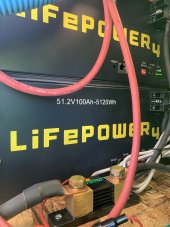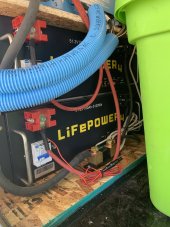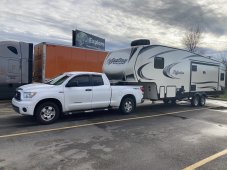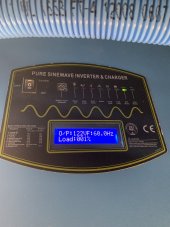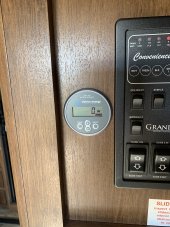Petenebraska
New Member
- Joined
- Dec 8, 2022
- Messages
- 55
My wife and I now live fulltime in our 34' fifth wheel. We are currently in TX. In October, we went to Hawaii for a month and while we were there, I contracted with a company in Idaho to install a solar system. I now have 18 - 100w panels, a 6000w inverter/charge controller, 2 100ah/ 48v LiFePo rack batteries and a battery monitor (SOC reader). I started having troubles with it immediately but was assured that it was an exceptionally robust system and would accommodate our lifestyle of travelling and following the weather (not running the A/C units "all the time".) Through many conversations with the installer (who is great, by the way) we are leaning in the direction that the Dometic RV fridge (absorption style) is sucking too much juice. It pulls 400 - 500w for most of the day. It's very rarely pulling less than 350w. Well, that doesn't pencil out and my installer says that his research suggests that RV fridges are supposed to be MORE efficient than residential, so he can't imagine how it's pulling so much.
When the system was installed, the installer decided to leave the whole 12v system (12v lead acid battery, 12v charger/converter, wiring, fuses, etc) intact and just bypass all of that and wire directly from the new 6000w inverter to the breaker panel. Initially, I thought that sounded like a good idea, but my continuing problems make me think that wasn't the best design?
Does anyone have any suggestions about A.) Should we have pulled the existing 12v system out of the trailer prior to installing the new system and installing a DC to DC converter?
B.)Have you ever heard of an RV fridge pulling this much juice and do you know of a "fix". I'm considering buying a new, small residential fridge to replace this one and just plug into the 110v outlet in the fridge cabinet and letting the 48v batteries handle it without the added complications of the 12v DC and propane inputs.
Thanks!
Pete
When the system was installed, the installer decided to leave the whole 12v system (12v lead acid battery, 12v charger/converter, wiring, fuses, etc) intact and just bypass all of that and wire directly from the new 6000w inverter to the breaker panel. Initially, I thought that sounded like a good idea, but my continuing problems make me think that wasn't the best design?
Does anyone have any suggestions about A.) Should we have pulled the existing 12v system out of the trailer prior to installing the new system and installing a DC to DC converter?
B.)Have you ever heard of an RV fridge pulling this much juice and do you know of a "fix". I'm considering buying a new, small residential fridge to replace this one and just plug into the 110v outlet in the fridge cabinet and letting the 48v batteries handle it without the added complications of the 12v DC and propane inputs.
Thanks!
Pete



